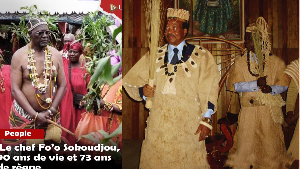The resident representative of the International Monetary Fund (IMF) in Cameroon, has told British businesspersons that Cameroon is an attractive hub for business in the Central African Sub Region.
Kadima Kalonji made the statement recently while addressing the UK Trade Mission in Cameroon.
While highlighting a number of opportunities in Cameroon, the IMF Economist said the country is the gateway to both the Central and West African Regions.
Corroborating the view that Cameroon is an attractive business destination, the Chief Executive Officer (CEO) of the Standard Chartered Bank, ChuksUgha, said the bilingual nature of the country is an added advantage. To him, Cameroon’s official languages, English and French, are spoken across the continent of Africa.
He said the Standard Chartered Bank is one of the British business outfits that have been faring well in Cameroon.
As the largest economy in the CEMAC Region, he went on; Cameroon has been very resistant to global challenges.
He said Cameroon is one of the few African countries that bags only a circa seven percent of its Gross Domestic Product, GDP, from oil and gas exports.
Ugha equally highlighted the country’s growth rate of six percent and the inflation rate of three percent.
Besides, he lauded the country’s external debt management, saying it was relatively low. The fact that the country’s external debt is still at 30percent is a pointer that the economy is resistant to many challenges.
He cited the Douala and Kribi seaports to prove that Cameroon has advantages that stand tall above those of the land-locked countries in the CEMAC Sub-Region.
The CEO of the Standard Chartered Bank that was established in Cameroon 29 years ago told the British investors to be patient when doing business in Cameroon.
Richard Antonin Doffonso from the African Development Bank was another speaker who briefed the UK Trade Mission.
According to him, gains from the diversified nature of Cameroon’s economy accounts for 40 percent of GDP. He said it was the dynamism of the Cameroon’s economy that the World Bank classified it in 2014 as one of the mixed economies.
The ADB official painted a beautiful portrait of Cameroon economy, stating that poverty in the country was declining.
But the British High Commissioner to Cameroon, Brian Olley, warned the British investors not to be naïve because doing business in Cameroon was equally full of challenges.
He cited the ill of corruption which, he said, is manifested in the snail pace treatment of files as subtle blackmail for bribes. He, however, said measures were being taken to stem the tides of the scourge.
He told the investors that another challenge was that, it is difficult to find credible and trusted business partners in Cameroon, urging them to be vigilant.
Another speaker at the occasion was renowned International Lawyer, Ntumfor Nico Halle.
He called on the Government and other actors to ensure the triumph of an enabling business environment that can attract more investors to create riches in the country.
The UK Trade Mission that explored business opportunities were responding to an invitation from the Prime Minister, Philemon Yang, who led a delegation to London last year.
While the UK Trade mission was still in the country, the anti-corruption and watchdog, Transparency International, TI, released a report in which Cameroon was classified as the second most corrupt country in Africa.
Infos Business of Wednesday, 16 December 2015
Source: The Post Newspaper













